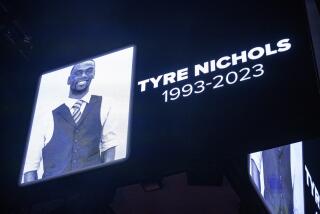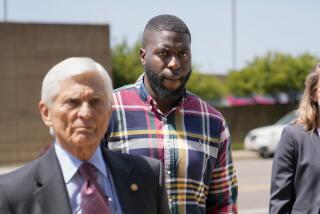Nichols Jury Hears Victims’ Families Describe Their Pain
DENVER — Prosecutors hoping to win a death sentence for Terry L. Nichols played sharply to the jury’s emotions Tuesday, showcasing testimony from those who suffered the most after the Oklahoma City bombing--the sons, fathers, mothers and daughters of xthe dead.
Donald Farrell described life after the death of his daughter, 37-year-old Susan Farrell, a federal government lawyer who was planning a baby shower for a co-worker.
Both women died in the blast, he said, “and they found Susan’s body on the Friday night after the bombing, about the time she would have been hosting the party.”
Carla Wade, an Oklahoma City radio reporter, told the jury about broadcasting a talk show the morning of the blast, only to find out that her father, Johnny Wade, a government civil engineer, was among the 168 dead at the Alfred P. Murrah Federal Building.
Then a National Merit scholar at the University of Oklahoma, she soon found herself failing in school. “I’m still in weekly counseling, 2 1/2 years later,” she said.
Since the Nichols jury returned a split verdict last week, prosecutors are hoping the victims’ powerful testimony, which is drawing tears from those in the spectator gallery, will equally move the jurors to vote for a sentence of death.
But compared to others in the courtroom, the jurors have not shown a lot of emotion since the sentencing phase began Monday. On Tuesday, when the government presented two dozen victims in the courtroom, only one juror, a young woman in the front row, was seen openly crying in the morning. But by the afternoon, she and a few others were wiping away tears.
The jury found Nichols guilty of conspiring with convicted co-defendant Timothy J. McVeigh in the bombing, but acquitted him of actually using the bomb to blow up the building April 19, 1995. The panel also found Nichols guilty of the lesser charge of involuntary manslaughter in the deaths of the eight federal law enforcement officers killed that morning.
The jurors now must decide whether the 42-year-old Nichols should be executed by lethal injection or given life in prison with no hope of release. If the jury cannot unanimously decide on a sentence, Judge Richard P. Matsch would impose a sentence of either life or a fixed term of years in prison.
Prosecutors have said they plan to present 60 victims over three days, at which time Nichols’ attorneys will begin offering testimony about his character as a husband and father, as well as additional information suggesting that others were more involved in the blast and are not being punished.
But this week the focus has been on victims and the government’s push to make their stories help convince the jury to send Nichols to his death.
Kevin Gottschall lost his 6-month-old son, Lee, in the blast. “Not a day goes by I don’t miss Lee,” he told the jury. “We have his pictures around the house. We still talk to him.”
Fred Anderson told how his wife, a nurse, rushed to the scene of the explosion to help others, only to suffer a severe head injury amid the debris that ultimately took her own life.
Anderson now sits alone at home. “I just don’t deal with anything anymore,” he said. “It’s like, why bother?”
Chris Cegan’s mother, Kathy, worked in the first-floor Social Security office and died there. He tried to explain the emptiness he now feels, but his tears washed over him on the witness stand.
“You can’t replace a mom,” he said.
More to Read
Sign up for Essential California
The most important California stories and recommendations in your inbox every morning.
You may occasionally receive promotional content from the Los Angeles Times.











